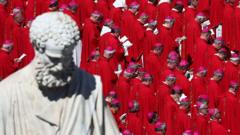Sarah Rainsford
Europe Correspondent
Reporting fromRome

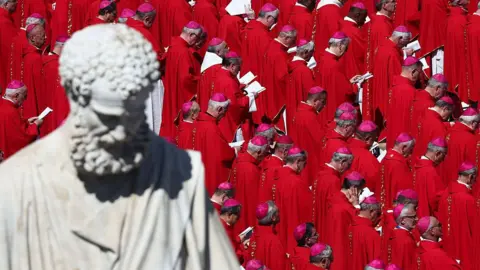 Getty Images
Getty Images
This must be the most secretive election in the world.
When 133 Catholic cardinals are shut into the Sistine Chapel on Wednesday to choose a successor to Pope Francis, each one will have sworn an oath on the gospels to keep the details under wraps for life.
The same goes for every person inside the Vatican during the conclave: from the two doctors on hand for any emergency, to the dining-room staff who feed the cardinals. All vow to observe “absolute and perpetual secrecy”.
Just to be sure, the chapel and the two guesthouses will be swept for microphones and bugs.
“There are electronic jammers to make sure that phone and wi-fi signals are not getting in or out,” said John Allen, the editor of Crux news site.
“The Vatican takes the idea of isolation extremely seriously.”
Total lockdown
The lockdown isn’t only about keeping the voting process secret.
It is also intended to stop “nefarious forces” from hacking information or disrupting proceedings, and to ensure those voting are not influenced by the outside world on what will perhaps be one of the biggest decisions of their lives.
Catholics will tell you the election is guided by God, not politics. But the hierarchy takes no chances.
On entering the conclave, everyone is obliged to surrender all electronic devices including phones, tablets and smart watches. The Vatican has its own police to enforce the rules.
“The logic is trust but verify,” John Allen said.
“There are no televisions, newspapers or radio at the guesthouse for the conclave – nothing,” said Monsignor Paolo de Nicolo, who was head of the Papal household for three decades.
“You can’t even open the windows because many rooms have windows to the exterior world.”

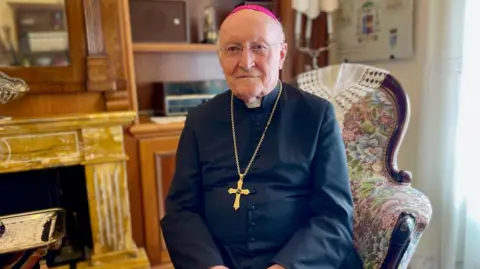
Everyone working behind the high Vatican walls for the conclave has been heavily vetted. Even so, they are barred from communicating with electors.
“The cardinals are completely incommunicado,” said Ines San Martin of the Pontifical Mission Societies in the US.
“There will just be walkie-talkies for some specific circumstances like, ‘we need a medic,’ or ‘Hey, the Pope has been elected, can someone let the bell-ringers in the Basilica know.'”
So what if someone breaks the rules?
“There is an oath, and those who do not observe it risk ex-communication,” Msgr De Nicolo says, meaning exclusion from the church. “No one dares to do this.”
Cardinal hunting
It’s a different matter in the run-up to the conclave.
Officially, the cardinals are banned from commenting even now. But from the moment Pope Francis was buried, parts of the Italian press and many visitors turned cardinal-hunters, trying to suss out his most likely successor.
They’ve been scouring establishments around the Vatican, ready to speculate on any sightings and possible alliances.
“Wine and Rigatoni: the Cardinals’ Last Suppers”, was one headline in La Repubblica which described the “princes of the church” enjoying “good Roman lunches” before lockdown.
Reporters have then been grilling waiters on what they might have overheard.
“Nothing,” one of the servers at Roberto’s, a couple of streets back from St Peter’s, told me this week.
“They always go quiet whenever we get close.”

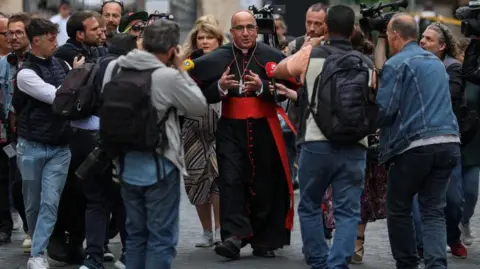 Reuters
Reuters
The other prime spot to catch a cardinal is beside the basilica itself, next to the curve of columns that embraces the main square. Each morning there’s a huddle of cameras and reporters on the lookout for the men in lace and scarlet robes.
There are now close to 250 cardinals in the city, called here from all over the world, although those aged 80 or over are not eligible to vote.
As they head into the Vatican for their daily congregations to discuss the election, each one is surrounded and bombarded with questions on progress.
They’ve given away little in response beyond the “need for unity” or assurances that the conclave will be short.
The outside world
“The whole idea is for this to be a religious decision, not a political one,” Ines San Martin explains. “We say the Holy Spirit guides the conversation and the vote.”
But the Pope heads a huge, wealthy institution with significant moral authority and global sway on everything from conflict resolution to sexual politics.
So the man chosen – and his vision and priorities – matter far beyond the Vatican.
Certain Catholic monarchs had a veto on the election up until 1907. Today, voices from all quarters try to influence the debate – most obviously through the media.
At one point, Rome’s Il Messaggero chided a presumed front-runner, Italian Cardinal Parolin, for “a sort of self-candidacy”.
Then there was a video clip of Filipino Cardinal Tagle singing John Lennon’s Imagine, apparently released to dent his popularity. It went viral instead.

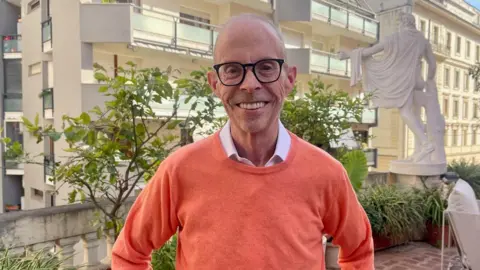
Meanwhile, a glossy book highlighting some potential contenders is doing the rounds, lauding conservatives like Cardinal Sarah of Guinea for condemning the “contemporary evils” of abortion and the “same-sex agenda”.
“There are groups in town who are trying to bang the drum on issues of interest to them,” John Allen says. “The cardinals are aware of this kind of thing, they read the papers. But they will do everything they can to block it out.”
“Are there lobbies going on? Yes, like in every election,” Ines San Martin agrees. “But it’s not as loud as I thought it would be.”
She argues that is partly because Pope Francis appointed so many new cardinals, including from new places.
“Fifty or sixty percent of them don’t even know one another. So even if you were an outside group, trying to have an agenda, it’s very hard even to pick your cardinals to begin with.”
Shutting out the noise
By Wednesday morning, all the electors should be in place inside the Vatican – stripped of their phones and sealed off from the rest of the world.
John Allen believes personal preference will dominate over politics, ‘liberal’ or ‘conservative’ factions or the “rattle and hum of public debate”.
“I really think the cardinals’ discussions among themselves right now is key,” said Ines San Martin. “A lot have been speaking up for the first time. You never know just how inspiring one of them might be.”


